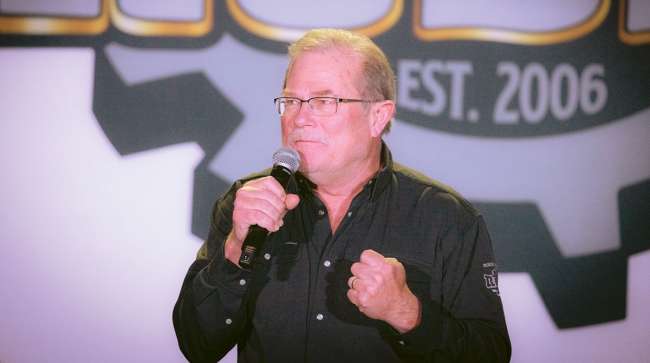Staff Reporter
Rush Enterprises Boss Anticipates Truck Sales Slowdown

[Stay on top of transportation news: Get TTNews in your inbox.]
SAN ANTONIO — Rush Enterprises Inc. CEO CEO W.M. “Rusty” Rush anticipates a slowdown in truck sales next year, with the industry steadily catching up on its backlog of orders.
The coronavirus pandemic brought with it major disruptions across global supply chains. This caused shortages for critical components in the manufacturing of trucks at a time when freight demand was high. The resulting backlog in trucks has kept sales strong even as the freight market has slowed significantly this year.
2023 GRAND CHAMPION: Michael French of Rush Truck Centers in Dallas takes top honors
“The backlogs have already shrunk way down,” Rush told reporters during the Rush Enterprises Tech Skills Rodeo, held Dec. 10-13. “We were still selling into the first quarter — that was a week and a half ago. You can just look at the numbers, and what’s left is spread out in the backlog. Where, if you go back to the last two years, we were on allocation, I don’t believe there really is true allocation out there right now.”
Rush added the truck-making industry still is on allocation in a sense, but it’s better than what was happening in the previous couple of years when wait times were much longer. He noted most OEMs have tried just to price through the first six months of next year, with the exception of their larger deals.
I would have thought we would have slowed down sooner and wouldn’t have sold as many trucks as what we sold.
Rush Enterprises CEO W.M. "Rusty" Rush
“I believe we’ll have a little tougher summer,” Rush said. “Look, I’m baffled a little bit by what happened this last year. In my mind, we’ve been in a freight recession for 18 months. Let’s get real. I understand supply shortages, etc. I would have thought we would have slowed down sooner and wouldn’t have sold as many trucks as what we sold. And that’s one of the big problems we’re having. There’s an oversupply.”
The strong freight market in the previous couple of years caused spot rates to spike. This trend was met with an influx of smaller carriers and owner-operators entering the spot market to take advantage of the potential profits. Rush has started to see that become rightsized as freight demand has fallen this year, but he believes more needs to happen.

CEO W.M. "Rusty" Rush exults as he poses with the winners of the Rush Enterprises Tech Skills Rodeo at the awards banquet in San Antonio on on Dec. 12. (Connor D. Wolf/Transport Topics)
“With rates where they’re at, I’m not talking about interest rates, I’m talking about contract rates and spot market rates, there has to be a little bit of that weeding out,” Rush said. “You read what all the big shippers will tell you, they’ll tell you the same thing, that’s what they’ve been waiting on. Now, that’s on the [truckload] side. The [less-than-truckload] side is a whole different game.”
Rush noted the LTL segment doesn’t seem to be as volatile as truckload. He pointed to exceptions, such as the closure of Yellow Corp., but said that side of trucking has been doing well. He believes that freight market as a whole has already reached bottom and has just been bouncing along it in the meantime.
ERoad's Craig Marris gives advice on carving out a practical, effective road map to a greener and more efficient fleet. Tune in above or by going to RoadSigns.ttnews.com.
“It’s just been a little baffling to me how the market stays so strong when you look at our customers,” Rush said. “Spot rates have been down 30%-40% for a year and a half, something like that; contract rates have been beat up; the interest rates are through the roof; used truck prices are down; those are four different things. Not one of them is a killer, but all of them combined, I would have just thought we wouldn’t stay as strong.”
Rush expects sales to remain strong through the first quarter of next year. But from there, he noted, the industry will have to wait and see. He also pointed to the possibility that the freight market could recover next year.
“I don’t see how you can keep that when you’ve already got an oversupply of trucks, in my mind,” Rush said. “You can look at acceptance rates and things like that for carriers coming from the shippers. Acceptance rates have been at all-time highs, really for the whole year.
Want more news? Listen to today's daily briefing above or go here for more info
“But I think certain sectors on the vocational side remain strong too. But I do look for a pullback next year. Some of the OMs are saying 10%; I’m saying 20%.”
The U.S. Environmental Protection Agency recently finalized what it called its strongest-ever national clean air standards to reduce emissions from heavy-duty trucks. The rules will go into effect beginning with model year 2027. Rush believes these rules will cause carriers to pull forward their replacement cycles in order to comply.
“Of course, everybody’s going to wake up and realize what’s coming on in ’27; you’ll get some pull forward,” Rush said. “People are going to get concerned with price and reliability, with all new aftertreatment systems.”




